
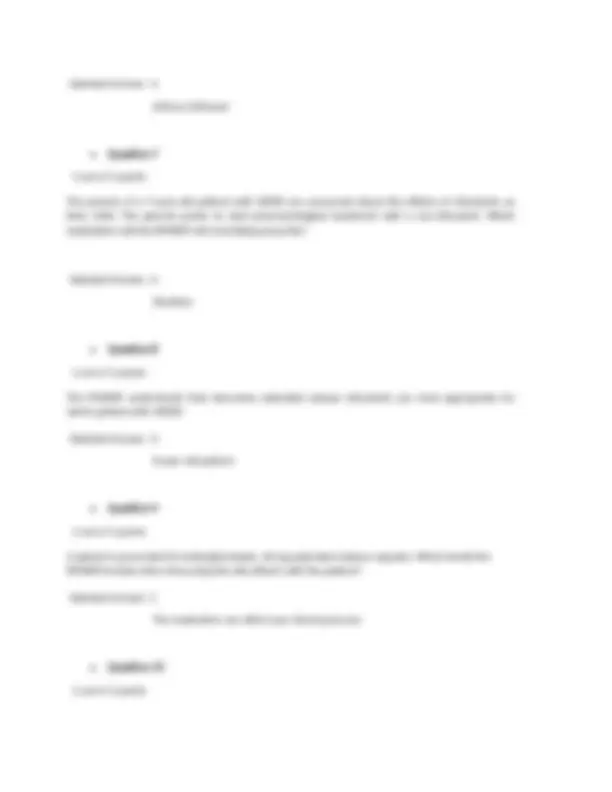
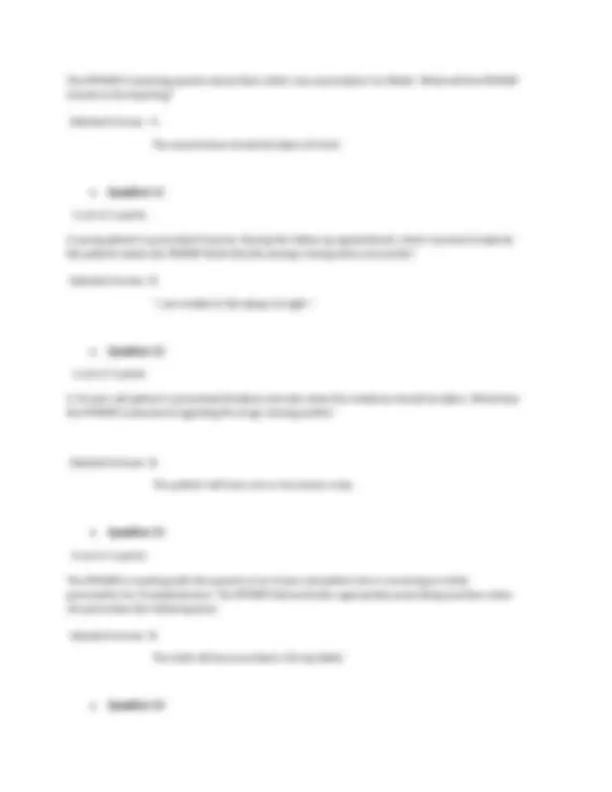
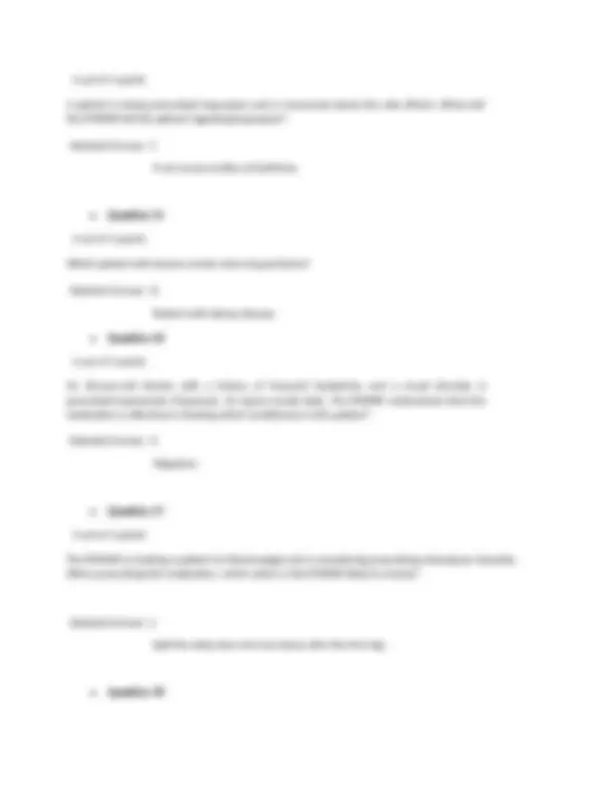
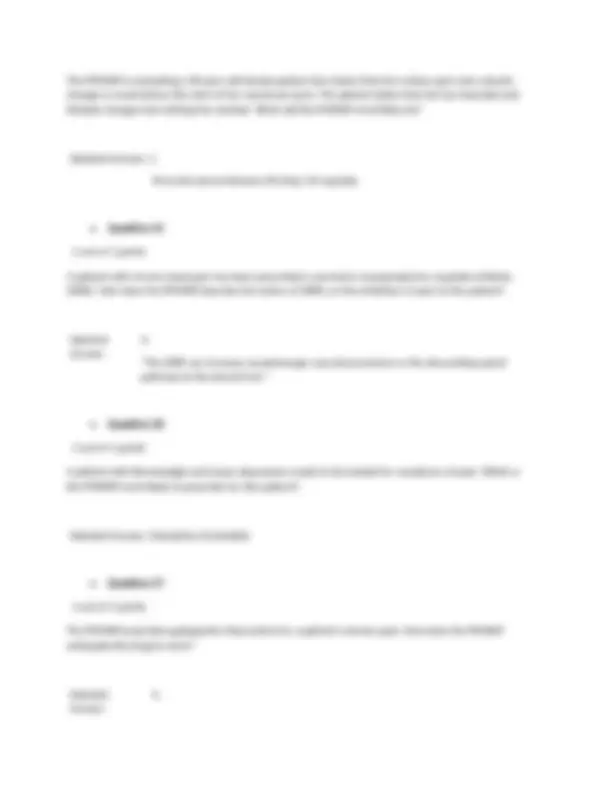
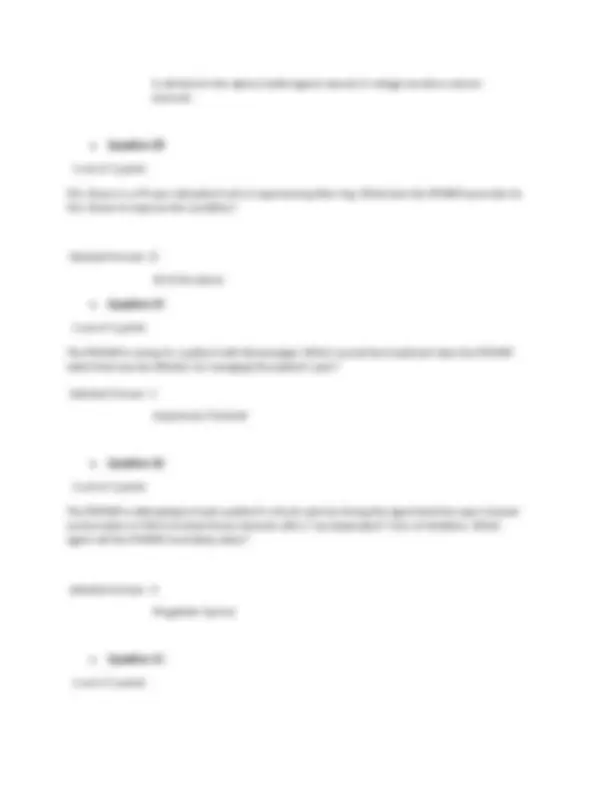
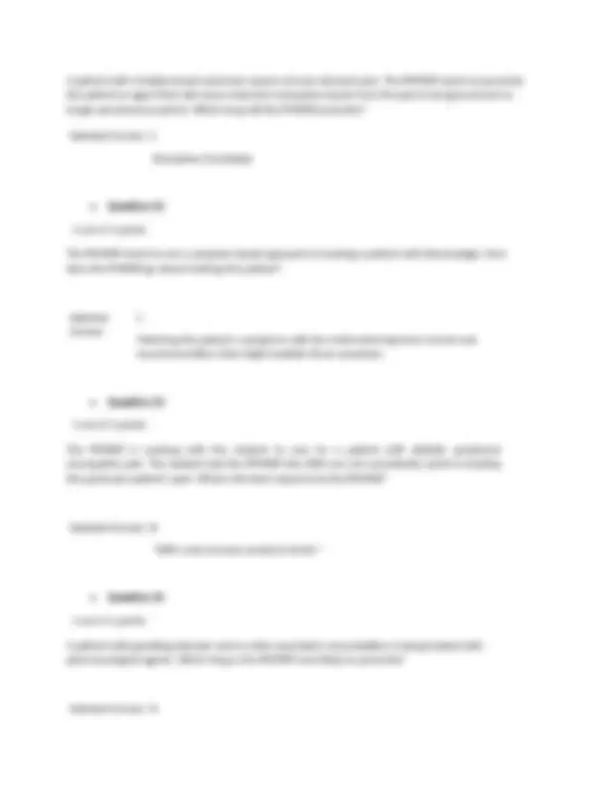
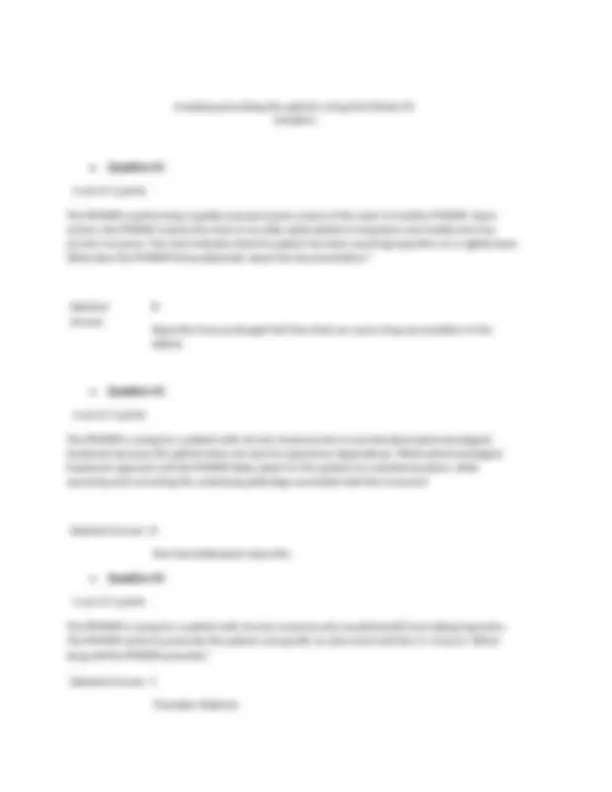
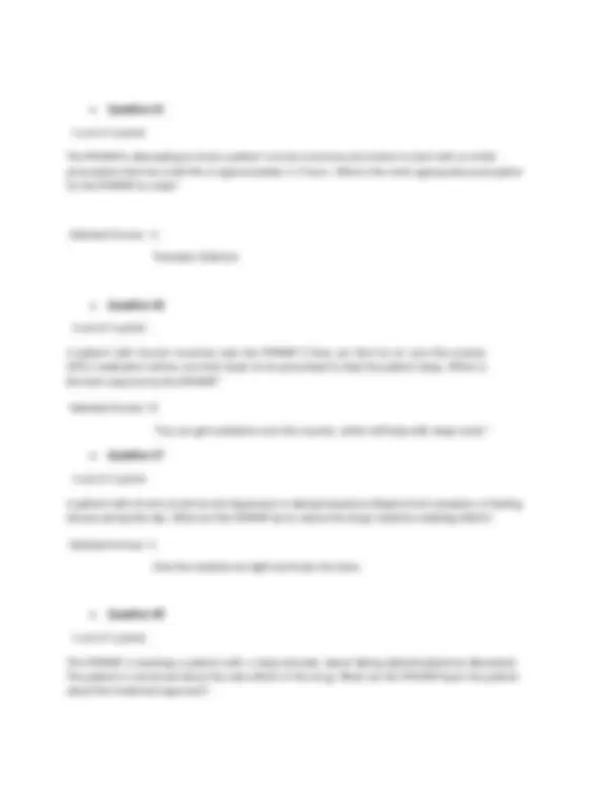
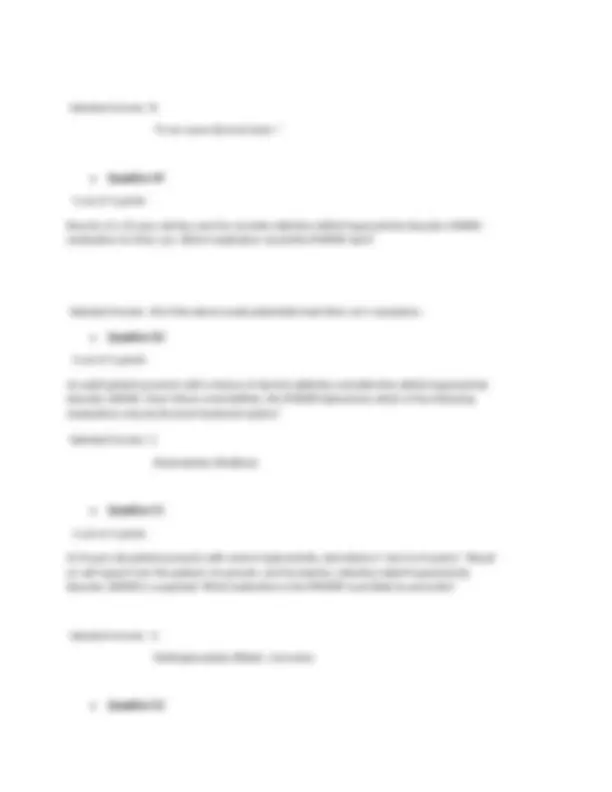
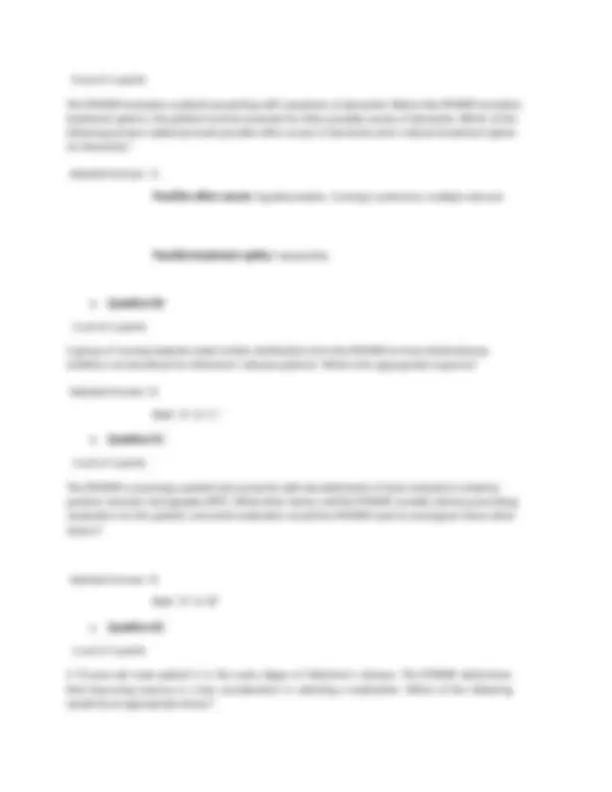
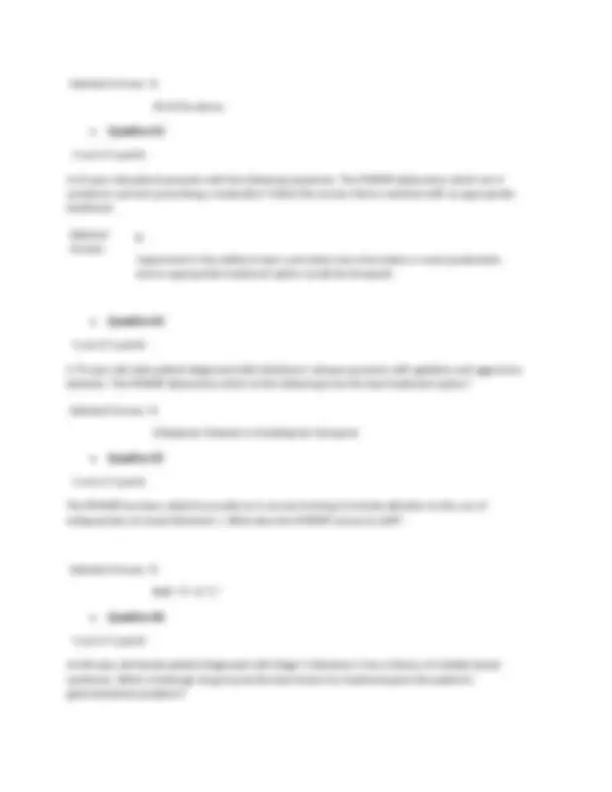
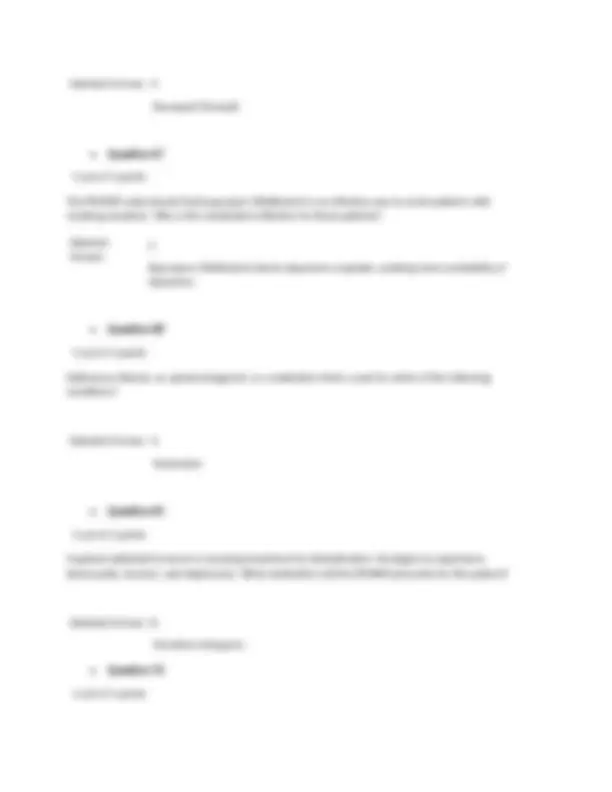
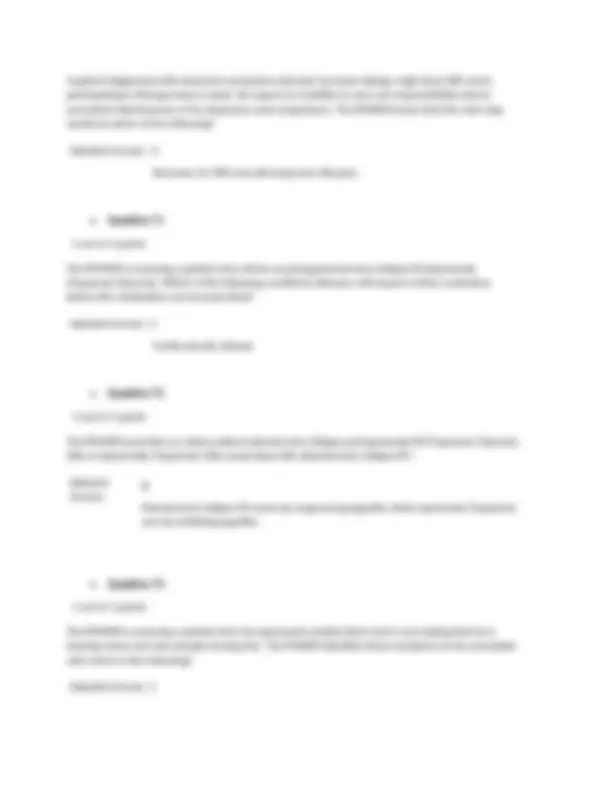
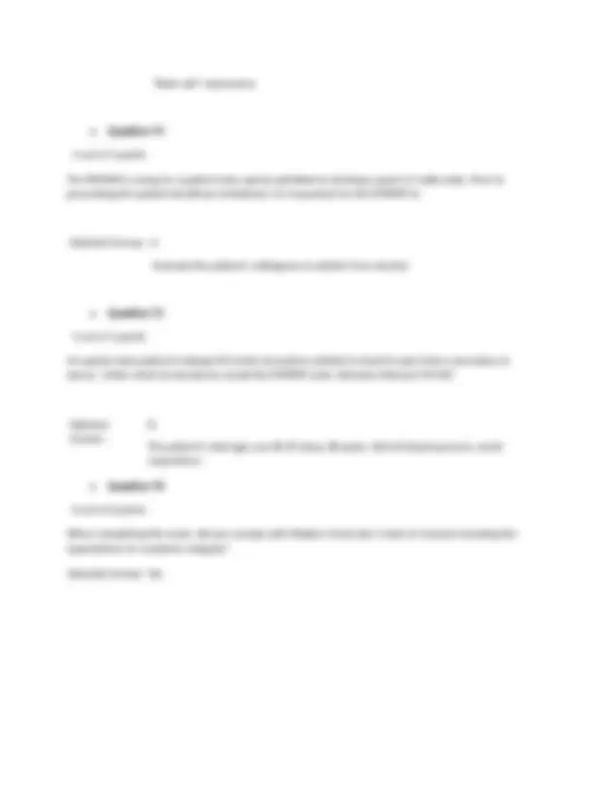


Study with the several resources on Docsity

Earn points by helping other students or get them with a premium plan


Prepare for your exams
Study with the several resources on Docsity

Earn points to download
Earn points by helping other students or get them with a premium plan
Community
Ask the community for help and clear up your study doubts
Discover the best universities in your country according to Docsity users
Free resources
Download our free guides on studying techniques, anxiety management strategies, and thesis advice from Docsity tutors
DNRS-6630/NURS-6630N/NURS-6630C/NURS-6630F/DNRS-6630F FINAL EXAM, PHARM FINAL.DNRS-6630/NURS-6630N/NURS-6630C/NURS-6630F/DNRS-6630F FINAL EXAM, PHARM FINAL.DNRS-6630/NURS-6630N/NURS-6630C/NURS-6630F/DNRS-6630F FINAL EXAM, PHARM FINAL.DNRS-6630/NURS-6630N/NURS-6630C/NURS-6630F/DNRS-6630F FINAL EXAM, PHARM FINAL.
Typology: Exams
1 / 22

This page cannot be seen from the preview
Don't miss anything!















Review Test Submission: Week 11 Final Exam Course NURS-6630D-3/NURS-6630N-3/NURS-6630F-3-Approaches to Treatment Fall Quarter 08/27-11/18-PT Test Week 11 Final Exam Started 11/10/18 1:37 PM Submitted 11/10/18 3:01 PM Due Date 11/12/18 1:59 AM Status Completed Attempt Score 72 out of 75 points Time Elapsed 1 hour, 24 minutes out of 2 hours Results Displayed Submitted Answers
- Question 1 1 out of 1 points What will the PMHNP most likely prescribe to a patient with psychotic aggression who needs to manage the top-down cortical control and the excessive drive from striatal hyperactivity? Selected Answer: C. Antipsychotics - Question 2 1 out of 1 points The PMHNP is selecting a medication treatment option for a patient who is exhibiting psychotic behaviors with poor impulse control and aggression. Of the available treatments, which can help temper some of the adverse effects or symptoms that are normally caused by D2 antagonism? Selected Answer: D. Second-generation, atypical antipsychotics
- Question 3 1 out of 1 points The PMHNP is discussing dopamine D2 receptor occupancy and its association with aggressive behaviors in patients with the student. Why does the PMHNP prescribe a standard dose of atypical antipsychotics? Selected Answer: C. The doses are based on achieving 60% D2 receptor occupancy. - Question 4 1 out of 1 points Why does the PMHNP avoid prescribing clozapine (Clozaril) as a first-line treatment to the patient with psychosis and aggression? Selected Answer: A. There is too high a risk of serious adverse side effects. - Question 5 1 out of 1 points The PMHNP is caring for a patient on risperidone (Risperdal). Which action made by the PMHNP exhibits proper care for this patient? </p? Selected Answer: C. Titrating the dose by increasing it every 5–7 days - Question 6 1 out of 1 points The PMHNP wants to prescribe Mr. Barber a mood stabilizer that will target aggressive and impulsive symptoms by decreasing dopaminergic neurotransmission. Which mood stabilizer will the PMHNP select?
The PMHNP is teaching parents about their child’s new prescription for Ritalin. What will the PMHNP include in the teaching? Selected Answer: A. The second dose should be taken at lunch.
- Question 11 1 out of 1 points A young patient is prescribed Vyvanse. During the follow-up appointment, which comment made by the patient makes the PMHNP think that the dosing is being done incorrectly? Selected Answer: B. “I am unable to fall asleep at night.” - Question 12 1 out of 1 points A 14-year-old patient is prescribed Strattera and asks when the medicine should be taken. What does the PMHNP understand regarding the drug’s dosing profile? Selected Answer: B. The patient will have one or two doses a day. - Question 13 0 out of 1 points The PMHNP is meeting with the parents of an 8-year-old patient who is receiving an initial prescription for D-amphetamine. The PMHNP demonstrates appropriate prescribing practices when she prescribes the following dose: Selected Answer: B. The child will be prescribed a 10-mg tablet. - Question 14
1 out of 1 points A patient is being prescribed bupropion and is concerned about the side effects. What will the PMHNP tell the patient regarding bupropion? Selected Answer: C. It can cause cardiac arrhythmias.
- Question 15 1 out of 1 points Which patient will receive a lower dose of guanfacine? Selected Answer: D. Patient with kidney disease - Question 16 1 out of 1 points An 18-year-old female with a history of frequent headaches and a mood disorder is prescribed topiramate (Topamax), 25 mg by mouth daily. The PMHNP understands that this medication is effective in treating which condition(s) in this patient? Selected Answer: A. Migraines - Question 17 1 out of 1 points The PMHNP is treating a patient for fibromyalgia and is considering prescribing milnacipran (Savella). When prescribing this medication, which action is the PMHNP likely to choose? Selected Answer: C. Split the daily dose into two doses after the first day. - Question 18
The PMHNP prescribed a patient lamotrigine (Lamictal), 25 mg by mouth daily, for nerve pain 6 months ago. The patient suddenly presents to the office with the complaint that the medication is no longer working and complains of increased pain. What action will the PMHNP most likely take? Selected Answer: A. Increase the dose of lamotrigine (Lamictal) to 25 mg twice daily.
- Question 22 0 out of 1 points An elderly woman with a history of Alzheimer’s disease, coronary artery disease, and myocardial infarction had a fall at home 3 months ago that resulted in her receiving an open reduction internal fixation. While assessing this patient, the PMHNP is made aware that the patient continues to experience mild to moderate pain. What is the PMHNP most likely to do? Selected Answer: A. Order an X-ray because it is possible that she dislocated her hip. - Question 23 1 out of 1 points The PMHNP is assessing a 49-year-old male with a history of depression, post-traumatic stress disorder (PTSD), alcoholism with malnutrition, diabetes mellitus type 2, and hypertension. His physical assessment is unremarkable with the exception of peripheral edema bilaterally to his lower extremities and a chief complaint of pain with numbness and tingling to each leg 5/10. The PMHNP starts this patient on a low dose of doxepin (Sinequan). What is the next action that must be taken by the PMHNP? Selected Answer: A. Orders liver function tests. - Question 24 1 out of 1 points
The PMHNP is evaluating a 30-year-old female patient who states that she notices pain and a drastic change in mood before the start of her menstrual cycle. The patient states that she has tried diet and lifestyle changes but nothing has worked. What will the PMHNP most likely do? Selected Answer: C. Prescribe desvenlafaxine (Pristiq), 50 mg daily
- Question 25 1 out of 1 points A patient with chronic back pain has been prescribed a serotonin-norepinephrine reuptake inhibitor (SNRI). How does the PMHNP describe the action of SNRIs on the inhibition of pain to the patient? Selected Answer:
“The SNRI can increase noradrenergic neurotransmission in the descending spinal pathway to the dorsal horn.”
- Question 26 1 out of 1 points A patient with fibromyalgia and major depression needs to be treated for symptoms of pain. Which is the PMHNP most likely to prescribe for this patient? Selected Answer: Duloxetine (Cymbalta) - Question 27 1 out of 1 points The PMHNP prescribes gabapentin (Neurontin) for a patient’s chronic pain. How does the PMHNP anticipate the drug to work? Selected A. Answer:
A patient with irritable bowel syndrome reports chronic stomach pain. The PMHNP wants to prescribe the patient an agent that will cause irrelevant nociceptive inputs from the pain to be ignored and no longer perceived as painful. Which drug will the PMHNP prescribe? Selected Answer: C. Duloxetine (Cymbalta)
- Question 32 1 out of 1 points The PMHNP wants to use a symptom-based approach to treating a patient with fibromyalgia. How does the PMHNP go about treating this patient? Selected Answer:
Matching the patient’s symptoms with the malfunctioning brain circuits and neurotransmitters that might mediate those symptoms
- Question 33 1 out of 1 points The PMHNP is working with the student to care for a patient with diabetic peripheral neuropathic pain. The student asks the PMHNP why SSRIs are not consistently useful in treating this particular patient’s pain. What is the best response by the PMHNP? Selected Answer: B. “SSRIs only increase serotonin levels.” - Question 34 1 out of 1 points A patient with gambling disorder and no other psychiatric comorbidities is being treated with pharmacological agents. Which drug is the PMHNP most likely to prescribe? Selected Answer: D.
Naltrexone
- Question 35 1 out of 1 points Kevin is an adolescent who has been diagnosed with kleptomania. His parents are interested in seeking pharmacological treatment. What does the PMHNP tell the parents regarding his treatment options? Selected Answer: A. “Naltrexone may be an appropriate option to discuss.” - Question 36 1 out of 1 points Which statement best describes a pharmacological approach to treating patients for impulsive aggression? Selected Answer: D. Opioid antagonists can be used to reduce drive. - Question 37 1 out of 1 points A patient with hypersexual disorder is being assessed for possible pharmacologic treatment. Why does the PMHNP prescribe an antiandrogen for this patient? Selected Answer: C. It will block testosterone. - Question 38 1 out of 1 points
Avoiding prescribing the patient a drug that blocks H receptors
- Question 42 1 out of 1 points The PMHNP is performing a quality assurance peer review of the chart of another PMHNP. Upon review, the PMHNP reviews the chart of an older adult patient in long-term care facility who has chronic insomnia. The chart indicates that the patient has been receiving hypnotics on a nightly basis. What does the PMHNP find problematic about this documentation? Selected Answer:
Hypnotics have prolonged half-lives that can cause drug accumulation in the elderly.
- Question 43 1 out of 1 points The PMHNP is caring for a patient with chronic insomnia who is worried about pharmacological treatment because the patient does not want to experience dependence. Which pharmacological treatment approach will the PMHNP likely select for this patient for a limited duration, while searching and correcting the underlying pathology associated with the insomnia? Selected Answer: D. Non-benzodiazepine hypnotics - Question 44 1 out of 1 points The PMHNP is caring for a patient with chronic insomnia who would benefit from taking hypnotics. The PMHNP wants to prescribe the patient a drug with an ultra-short half-life (1–3 hours). Which drug will the PMHNP prescribe? Selected Answer: C. Triazolam (Halcion)
- Question 45 1 out of 1 points The PMHNP is attempting to treat a patient’s chronic insomnia and wishes to start with an initial prescription that has a half-life of approximately 1–2 hours. What is the most appropriate prescription for the PMHNP to make? Selected Answer: A. Triazolam (Halcion) - Question 46 1 out of 1 points A patient with chronic insomnia asks the PMHNP if they can first try an over-the-counter (OTC) medication before one that needs to be prescribed to help the patient sleep. Which is the best response by the PMHNP? Selected Answer: D. “You can get melatonin over the counter, which will help with sleep onset.” - Question 47 1 out of 1 points A patient with chronic insomnia and depression is taking trazodone (Oleptro) but complains of feeling drowsy during the day. What can the PMHNP do to reduce the drug’s daytime sedating effects? Selected Answer: C. Give the medicine at night and lower the dose - Question 48 1 out of 1 points The PMHNP is teaching a patient with a sleep disorder about taking diphenhydramine (Benadryl). The patient is concerned about the side effects of the drug. What can the PMHNP teach the patient about this treatment approach?
1 out of 1 points A 9-year-old female patient presents with symptoms of both attention deficit hyperactivity disorder (ADHD) and oppositional defiant disorder. In evaluating her symptoms, the PMHNP determines that which of the following medications may be beneficial in augmenting stimulant medication? Selected Answer: C. Guanfacine ER (Intuniv)
- Question 53 1 out of 1 points A PMHNP supervisor is discussing with a nursing student how stimulants and noradrenergic agents assist with ADHD symptoms. What is the appropriate response? Selected Answer: D. All of the above. - Question 54 1 out of 1 points A 43-year-old male patient is seeking clarification about treating attention deficit hyperactivity disorder (ADHD) in adults and how it differs from treating children, since his son is on medication to treat ADHD. The PMHNP conveys a major difference is which of the following? Selected Answer:
Comorbidities are more common in adults, impacting the prescription of additional agents.
- Question 55 1 out of 1 points A 26-year-old female patient with nicotine dependence and a history of anxiety presents with symptoms of attention deficit hyperactivity disorder (ADHD). Based on the assessment, what does the PMHNP consider? Selected Answer: A.
ADHD is often not the focus of treatment in adults with comorbid conditions.
- Question 56 1 out of 1 points Which of the following is a true statement regarding the use of stimulants to treat attention deficit hyperactivity disorder (ADHD)? Selected Answer:
Signal strength output is increased by dialing up the release of dopamine (DA) and norepinephrine (NE).
- Question 57 1 out of 1 points The PMHNP is providing a workshop for pediatric nurses, and a question is posed about noradrenergic agents to treat ADHD. Which of the following noradrenergic agents have norepinephrine reuptake inhibitor (NRI) properties that can treat ADHD? Selected Answer: D. Both “A” & “C” - Question 58 1 out of 1 points A 71-year-old male patient comes to an appointment with his 65-year-old wife. They are both having concerns related to her memory and ability to recognize faces. The PMNHP is considering prescribing memantine (Namenda) based on the following symptoms: Selected Answer: C. Amnesia, apraxia, agnosia - Question 59
Selected Answer: D. All of the above
- Question 63 1 out of 1 points A 63-year-old patient presents with the following symptoms. The PMHNP determines which set of symptoms warrant prescribing a medication? Select the answer that is matched with an appropriate treatment. Selected Answer:
Impairment in the ability to learn and retain new information is most problematic, and an appropriate treatment option would be donepezil.
- Question 64 1 out of 1 points A 75-year-old male patient diagnosed with Alzheimer’s disease presents with agitation and aggressive behavior. The PMHNP determines which of the following to be the best treatment option? Selected Answer: D. Citalopram (Celexa) or Escitalopram (Lexapro) - Question 65 1 out of 1 points The PMHNP has been asked to provide an in-service training to include attention to the use of antipsychotics to treat Alzheimer’s. What does the PMHNP convey to staff? Selected Answer: D. Both “A” & “C.” - Question 66 1 out of 1 points An 80-year-old female patient diagnosed with Stage II Alzheimer’s has a history of irritable bowel syndrome. Which cholinergic drug may be the best choice for treatment given the patient’s gastrointestinal problems?
Selected Answer: A. Donepezil (Aricept)
- Question 67 1 out of 1 points The PMHNP understands that bupropion (Wellbutrin) is an effective way to assist patients with smoking cessation. Why is this medication effective for these patients? Selected Answer:
Bupropion (Wellbutrin) blocks dopamine reuptake, enabling more availability of dopamine.
- Question 68 1 out of 1 points Naltrexone (Revia), an opioid antagonist, is a medication that is used for which of the following conditions? Selected Answer: A. Alcoholism - Question 69 1 out of 1 points A patient addicted to heroin is receiving treatment for detoxification. He begins to experience tachycardia, tremors, and diaphoresis. What medication will the PMHNP prescribe for this patient? Selected Answer: D. Clonidine (Catapres) - Question 70 1 out of 1 points